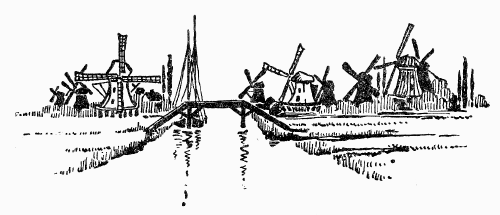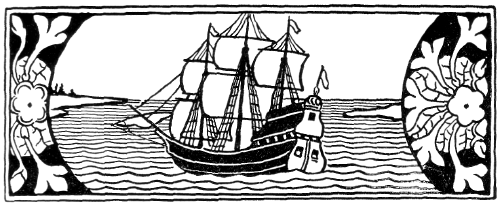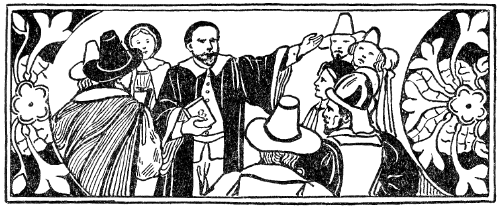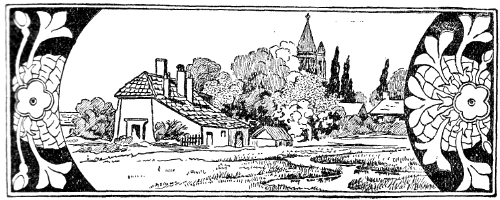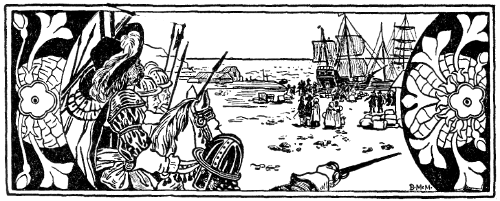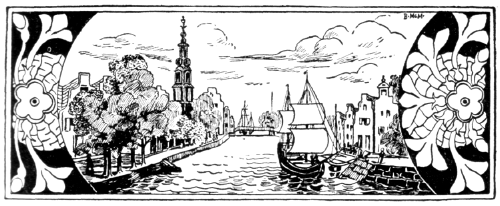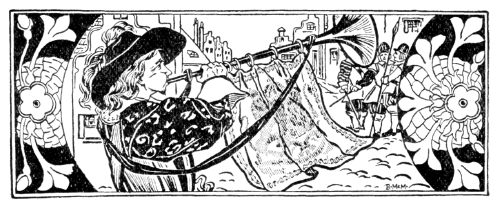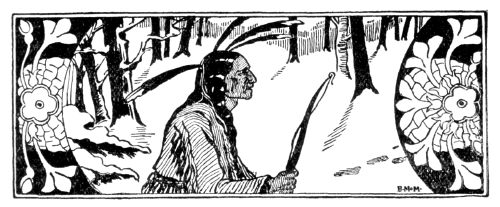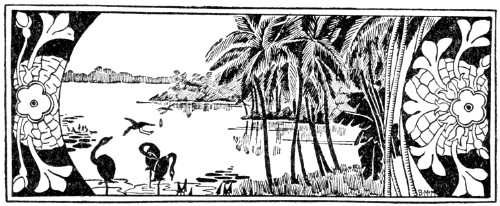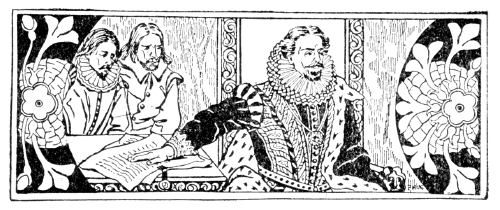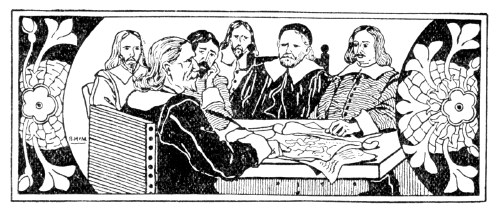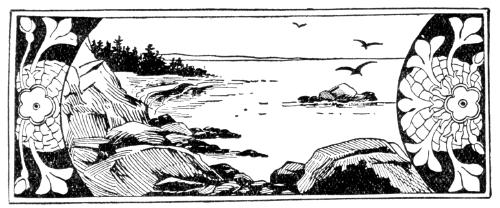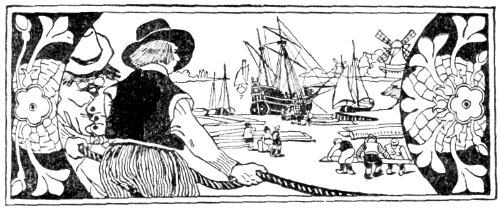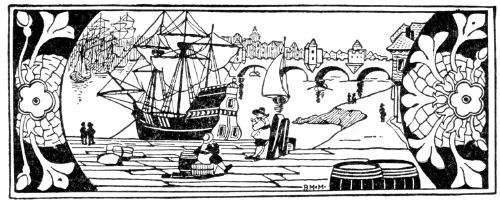| 1999-2004 (Return to Web Text-ures) |
Click Here to
return to Voyage of the Mayflower Content Page |
 (HOME) |
|
FLIGHT INTO HOLLAND
A NEW CHURCH! and if need be a new home in a new land, where they might lay the foundation of this great boon, were the only conditions demanded by the early Puritans from the Established Church in England; but this was not to be accorded them by either Church or State, which not only attempted to oppress further dissension, but denied the right of "freedom of worship" to those who had already chosen to separate themselves from the Mother Church. This led to the final emigration to the New World in the Mayflower when a company of one hundred and two souls sailed from Plymouth, England, September 6, 1620. Preceding their actual departure, their troubles were grave and numerous: first of all, in England, the home of their birth, where they were harassed and persecuted; and in Holland, "then a hotbed of heresies," whence they afterward fled, and where they had much to fear from anticipated political changes. The Puritans first took the name from their efforts to preserve purity in divine worship. They were the reformers of the Church, who wished to reduce religion to the literal text of the Scriptures, barring all symbols, forms, and ceremonies. Individual dissension and the inability to secure authoritative recognition, or even immunity from molestation for their future profession of faith, finally culminated in their exodus to the Low Countries in 1607. Here were already located certain rabid opponents of the Church who had emigrated during the latter part of the previous century, and here also awaited a welcome for new-comers of any faith. The Puritans wished not to ally themselves with those of extreme views, although their progenitors, known as Separatists, and sometimes referred to as Extremists, were not really of such views. They were a strong sect as early as 1575, some of whom had already fled to Holland under the charge of Robert Brown, -- a man whom the exiles were loath to accept as their leader on account of his lack of moral texture and weakness of character. William Brewster was finally ordained their pastor; he was not of extremist views, although a staunch Puritan. Some years previous he had withdrawn from the Established Church and had conducted meetings in the drawing-room of the Manor House at Scrooby, where he was the King's Agent and Postmaster -- a position which bespoke integrity and worthiness, despite his dissent from the rule of the Church. From the vicinity of Scrooby and Austerfield, a few adherents of Puritanic views gathered around a self-appointed leader in 1607, with the determination to break away from the oppressive rule of the Crown. This was to be accomplished by flight to the Low Countries, where a few kindred spirits had already found a foothold. They purposed starting from Boston, in Lincolnshire, in a small vessel chartered for the purpose, but, before embarking, their plans were communicated to the government by the ship's captain, who feared the displeasure of the authorities should he lend his aid to any seditious movement, hence the attempt was accordingly frustrated before any appreciable headway had been made. For a year the spark smouldered, when they again made the attempt, intending to sail from Grimsby and Hull in a Dutch vessel commanded by its owner, who, it was presumed, would not be susceptible to subjugation by the English authorities. As before, their number soon began to assemble at the port of embarkation, but before they could all be got on board, and while many families were separated, a company of soldiery came upon them and caused them to disperse. The captain, true to his agreement, however, set sail across the Channel with those already on board. Later attempts finally succeeded in getting all of the original party over to Amsterdam, where they lived peacefully for a time and consummated their plans for future organization, "amid a strange and uncouth language, different manners and customs, and strange fashions and attires." Subsequently they removed to the "fair and beautiful city of Leyden," twenty-two miles distant on the river Meuse, and already famous for its University. Here they resided under the able ministry and prudent government of John Robinson and William Brewster, occupying themselves at such trades and accomplishments as they were best fitted for. In Leyden there were about three hundred communicants of the Church, and a like number still remained in Amsterdam, representing practically those who had exiled themselves in the early years of the Separatist movement and those who came afterward, the Puritans -- in all, about six hundred able-bodied adults. Their Church, however, received no further recruits from England and was not increased by proselytes from Holland. In 1617 the end of the twelve years' truce between Spain and the United Provinces drew near, and, foreseeing that preparations of war would soon begin anew, they anxiously bethought of the future. A new regime might prove antagonistic to their views, and conflict might even reduce their own ranks. Hence they were once more forced to consider removing their Church to a place of safety. Being of firm mind and earnest purpose, they wished not to err by remaining too long in Holland, as at this time their idea was to perpetuate a church already established. Ever and anon their first purpose was the safety of their Church, now so well assured could they but find a permanent and likely abiding-place. Their thoughts turned naturally to the New World, which, although at the time comparatively unpeopled, was fruitful and fit for habitation, and offered more than ordinarily favorable conditions for the founding of future settlements, being practically open to occupation throughout the entire length of the Atlantic Coast. After their twelve years' residence among the Dutch, they were, under the existing conditions, generally speaking, of one mind as to America, even considering that practically its sole inhabitants were the savage red men, of whom every European must have had an unfavorable if not a formidable idea. They were of divided opinion, however, as to the most desirable location. Some were for Virginia, and still others for Guiana on the Southern Continent -- a locality first discovered by Sir Walter Raleigh, and of which glowing accounts were heard. Except Virginia, first colonized in 1607, there was at this time no well-defined settlement in North America. A few huts occupied the later sites of Albany and New Amsterdam as the result of Hendrik Hudson's voyage, but no colony was planted on Manhattan Island until 1627. The "hot country," as it was called, did not meet with their full approbation, on account of the possible dire effects arising from the high temperature, and Virginia was likewise objectionable as being possibly too much under the iron rule of the Mother Country -- a state of affairs which the Puritans were particularly anxious to avoid; furthermore, they wished a location readily accessible and not isolated to so great an extent as to subject them to the fear of attack by the Indians. It was at length concluded to live as a separate body, with full religious liberty, under the general civil government of Virginia, but as far distant from the settlement at Jamestown and yet be within the confines of the colony. The representatives of the Virginia colony in England were anxious to have them go thither on these terms, and were willing to grant them a patent with ample privileges of personal liberty and freedom of religion; and, further, to have the statements set forth therein, confirmed by the King's seal. This was not to be, however. King James, in spite of earnest efforts to induce him to sign the warrant, would not accede to certain of its specific terms, notably that of freedom of religion and personal liberty. For a time matters were in status quo, and further efforts in this direction were not put forth. Finally; after much solicitation, the King informed them that he would neither oppose nor intercept them in respect to either of the conditions from which he had previously withheld his signature, although even now refusing them official recognition. At this juncture, through the intervention of some persons of the merchant adventurer class -- a term applied to certain tradesmen and capitalists who undertook the shipment of goods or the fitting out of expeditions on speculation -- the means for procuring the necessary men, ships, and supplies were forthcoming. Among those whom they interested was a Mr. Weston, who came to Leyden at this time to confer with the main body and council, and immediately consummated articles of shipping and money advances, in behalf of himself and his associates in London. Through the same medium they were again assured that certain valuable tracts in the northern districts of Virginia were open to their occupation and settlement, and which were wholly exempt from governmental control, by even the local authorities. To which proposition they all the more readily inclined and enthused in consideration of the close proximity of the fishing grounds, an anticipated source of sustenance and profit, both items of great importance to the aspiring settlers. Many of these merchant adventurers were prominently identified with the Established Church and had no affiliation with the Puritans as to religious opinions, interesting themselves merely with a view to pecuniary profit, and as individuals held various views as to the choice of an ultimate location, some withdrawing their patronage when it was finally determined to give up all thoughts of Guiana or the southern country. By this, the stability and financial backing of the venture was somewhat impaired, but after extended correspondence and interviews final adjustments were made, acknowledgments recorded, and the actual labor attendant upon getting the party and supplies together and aboard ship begun. These trials and vicissitudes successfully overridden resulted in the banding together of the Puritans more firmly than ever, and in the hope of their hearts' desire their energies never once flagged. The first party was to be made up of members of the band from Holland, and of certain others from London who had become active in the affairs of fitting out the expedition. To transport the Holland contingent a small vessel was purchased and fitted out in that country -- the Speedwell, of about sixty tons -- it being their intention to retain this ship in their possession and engage with it in the fishing trade in the vicinity of their new home. In London was hired the Mayflower, of about "nine score" (one hundred and eighty tons), and which was intended merely to transport the present company thither and to return in a year's time.
|
